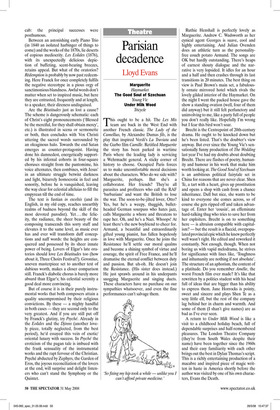Parisian decadence
Lloyd Evans
Marguerite Haymarket The Good Soul of Szechuan Young Vic Under Milk Wood Tricycle
This ought to be a hit. The Les Mis team are back in the West End with another French classic. The Lady of the Camellias, by Alexandre Dumas fils, is the play that inspired Verdi’s La Traviata and the Garbo film Camille. Retitled Marguerite the story has been parked in wartime Paris where the leading lady is servicing a Wehrmacht general. A sticky corner of history to choose. Occupied Paris forces us to make uncomfortable moral decisions about the characters. Who do we side with? Marguerite, perhaps. But she’s a collaborator. Her friends? They’re all parasites and profiteers who call the RAF ‘barbarians’ and want the British to lose the war. The soon-to-be-jilted lover, Otto? Yes, but he’s a weepy, thuggish, bulletheaded German sourpuss who hates jazz, calls Marguerite a whore and threatens to rape her. Oh, and he’s a Nazi. Whoops! At least there’s the new boyfriend to cheer for. Armand, a beautiful and extraordinarily gifted young pianist, has fallen hopelessly in love with Marguerite. Once he joins the Resistance he’ll settle our moral qualms and become a shining symbol of virtue and courage, the spirit of Free France, and he’ll dramatise the eternal conflict between duty and passion. But uh-oh. He doesn’t join the Resistance. (His sister does instead.) He just sprawls around in his underpants snogging Marguerite and singing duets. These characters have no purchase on our sympathies whatsoever, and even the fine performances can’t salvage them. Ruthie Henshall is perfectly lovely as Marguerite. Andrew C. Wadsworth as her cynical agent Georges is suave, cool and highly entertaining. And Julian Ovenden does an athletic turn as the personalityfree couch potato Armand. The songs are OK but hardly outstanding. There’s heaps of earnest shouty dialogue and the narrative is very lopsided. It idles for an hour and a half and then crashes through its last transitions in 20 minutes. The best thing on view is Paul Brown’s main set, a fabulously ornate mirrored hotel which rivals the lovely gilded interior of the Haymarket. On the night I went the packed house gave the show a standing ovation (well, four of them did anyway) but it still felt perfunctory and uninvolving to me, like a party full of people you don’t really like. Hopefully I’m wrong but I fear this bird won’t soar.
Brecht is the Centrepoint of 20th-century drama. He ought to be knocked down but he’s been listed. That’s the doubter’s view anyway. But ever since the Young Vic’s sensationally funny production of The Wedding last year I’ve had my doubts about doubting Brecht. There are flashes of poetry, humanity and humour in his work that make him worth looking at. The Good Soul of Szechuan is an ambitious political fairytale set in China for reasons that are never clear. Shen Te, a tart with a heart, gives up prostitution and opens a shop with cash from a chance inheritance. Dull but nice, she wants to be kind to everyone she comes across, so of course she gets ripped off and taken advantage of. Enter her ‘cousin’, an effeminate hard-talking thug who tries to save her from her exploiters. Brecht is on to something here — is altruism compatible with capitalism? — but the result is a flaccid, overpopulated provincial epic which he knew perfectly well wasn’t right. He edited and reworked it constantly. Not enough, though. When not boring us with vapid melodrama, he strives for significance with lines like, ‘Toughness and inhumanity are nothing if not absolute’. The structure of an aphorism, the content of a platitude. Do you remember Amélie, the worst French film ever made? It’s like that rewritten by a politics student with his head full of ideas that are bigger than his ability to express them. Jane Horrocks is pointy, sweet and sincere and plays Shen Te as a sexy little elf, but the rest of the company lag behind her in charm and warmth. And some of them (I shan’t give names) are as bad as I’ve ever seen.
A return to Under Milk Wood is like a visit to a childhood holiday beach, full of dependable surprises and half-remembered pleasures. The London Theatre Company (they’re from South Wales despite their name) have been together since the 1960s and their easy familiarity with each other brings out the best in Dylan Thomas’s script. This is a richly entertaining production of a macabre and inspired piece of magic written in haste in America shortly before the author was visited by one of his own characters, Evans the Death.










































































 Previous page
Previous page